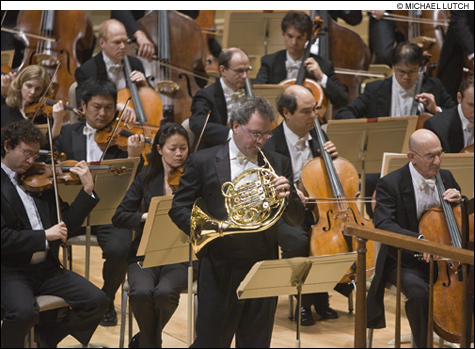The BSO and BVM celebrate America’s greatest living composer, plus Stockhausen’s Mantra, and music for Beckett

BLOWING ELLIOTT’S HORN: The performance of Carter’s Horn Concerto by James Sommerville
and the BSO was another season highlight.
|
James Levine’s devotion to the music of Elliott Carter — surely America’s greatest living composer, and maybe the greatest American composer ever — has been a boon to Boston. The highlight of the latest Boston Symphony Orchestra concert was Carter’s new Horn Concerto, which the BSO commissioned for its principal horn player, James Sommerville. It’s a delight, though as with anything by Carter, a single hearing is barely enough to take in its riches.
The performance seemed to go by much more quickly than the 11 minutes it actually took. It’s filled with incident: seven interlocked sections that change dramatically in speed, rhythm, and timbre. I can hardly think of another composer who’s caught so many of the sounds a horn can make, from muffled grunting to lyric outpouring to heroic trumpeting. As in most (all?) concertos, the solo instrument seems to represent the composer himself, here in his many moods of exploration and discovery, nervousness and soulfulness, self-abasement and self-assertion (that last blast), vigorous engagement and playfulness, and deepest solitude. The most immediately affecting passages, as often the case with Carter, were the eloquent slow ones. The second section is a lonely solo for the horn played against a flickering background of distant muted brasses. Three movements later, there’s another slow section, a Mahlerian Largo riding over hardly identifiable rumblings. (The score calls for 27 different percussion instruments.)
The performance seemed expert on the part of Levine and the orchestra and phenomenal on the part of Sommerville — though I also have a nagging sense that his playing was not yet as fully open to the concerto’s emotional and lyrical possibilities.
Bracketing the Carter were Haydn’s magnificent last symphony (No. 104, the London, in D) and Mahler’s exuberant first (also in D). The Haydn sounded unexceptional and pedestrian; the Mahler seemed awfully “adult,” more like a work of reflective age, like his Ninth Symphony, which Levine had led so memorably the week before, than Mahler’s youthful explosion of joy (especially joy in Nature), sarcasm, and rage. The first movement, marked “Schleppend” (“dragging,” as in the verb “to schlep”), was a little too weighty for its own good. Bassist Laurence Wolfe got closer to the right spirit in his third-movement solo, Mahler’s version of “Frère Jacques” in a coolly ironic minor key.
At Harvard the following day, Carter was presented — for the second time (the first was in 1988) — with the BSO’s prestigious $5000 Mark M. Horblit Award for distinguished symphonic composition by an American composer. “I’ve become a French horn,” the about-to-be-99-year-old Carter said when asked by Harvard’s Anne Shreffler about the new concerto. “It’s hard for me to talk about my pieces. I sit down and write and write and write. It’s hard to feel I’m the composer. I don’t know where they come from.” The award, he felt, was not for himself but for his music. “And my music is very grateful.”
Levine was also present, and he rather punted when Shreffler asked him what was so special about Carter’s music. He values Carter, he said, for the same reason he values all the other composers he loves, for his “tremendous vitality, individuality, and integrity.” Then Levine had a surprise: he went over to the piano that just happened to be on stage and played the US premiere of Carter’s Matribute, a delicately scintillating two-minute fantasy with a powerful and unexpectedly dark climax. The piece is dedicated to Levine’s mother, who just happened to be in the audience.
A week before, another group with a longstanding commitment to Carter, Richard Pittman’s Boston Musica Viva, presented a concert “Honoring Elliott Carter” that included two masterpieces, the 1982/1983 chamber piece Triple Duo and the 1999 song cycle Tempo e tempi, plus an anthology of smaller works either dedicated to or influenced by Carter that Carter himself helped select from a long list of possibilities — all in their Boston premieres. The shortest was Franco Donatoni’s Elly (his diminutive of “Elliott”), for piano, clarinet, and cello, barely a minute long (and conducted by Pittman). The most outrageous was Swiss composer Jürg Wyttenbach’s On Cheating the Fiddler, a setting of “five little poems by Dorothy Parker” that was a tour de force for Beyla Keyes, who both played her violin and mimed playing it, also tapped it, struck it, ran the tip of her bow against the stage, stamped her feet, whistled, hummed, and, yes, sang all the verses!
Frederic Rzewski’s 96 for Elliott Carter is a seductive set of connect-the-dot canons for unspecified instruments in five different octaves, here piccolo (Alicia diDonato), violin (Keyes), English horn (Nancy Dimock), cello (Jan Müller-Szeraws), and bass clarinet (William Kirkley); the notes of the canon spell C-A-R-T-E-R. These were also Betsy Jolas’s piano piece Calling E.C. (Geoffrey Burleson), Harrison Birtwistle’s Three Niedecker Verses (for cello and a “real” soprano, the admirable Elizabeth Keusch), György Kurtág’s two-movement Hommage à Elliott Carter, for English horn (Dimock), and, the most recent piece, Rand Steiger’s Nested Etudes for E.C., for solo oboe (Dimock again, with malfunctioning, static-ridden electronics).